Published May 31, 2014
Hill Street Blues' Lt. Hunter Was... Star Trek III's Captain Styles
Hill Street Blues' Lt. Hunter Was... Star Trek III's Captain Styles
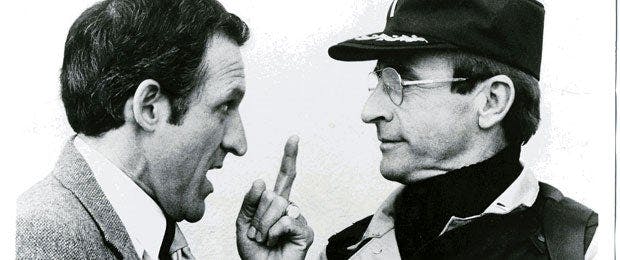
Star Trek III: The Search for Spock is no one’s idea of a comedy. It’s a dark film suffused with death and loss. Fortunately, though, James B. Sikking oh-so-perfectly played the pompous, stuffy Captain Styles, who strutted around the mighty Excelsior with his swagger stick and got to utter – as he lay in bed filing his nails -- one of the funniest lines in the movie: “How can you have a yellow alert in spacedock?” Sikking made the most of his extended cameo, so much so that when people think of Sikking’s extensive acting career, his work as Styles is usually mentioned in the same breath as his long runs as the pipe-smoking, super-serious Lt. Howard Hunter on Hill Street Blues (which is finally available on DVD) and Dr. David Howser, Doogie’s good-hearted and practical dad, on Doogie Howser, M.D., and as the icy-cold father of Jim Carrey, Jayne Brook and William McNamara in the acclaimed TV movie Doing Time on Maple Drive.
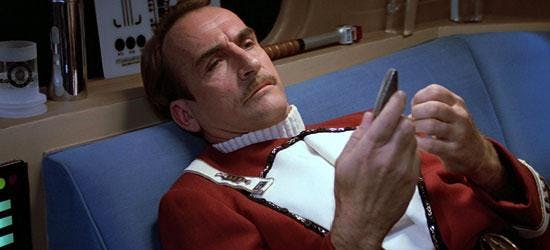
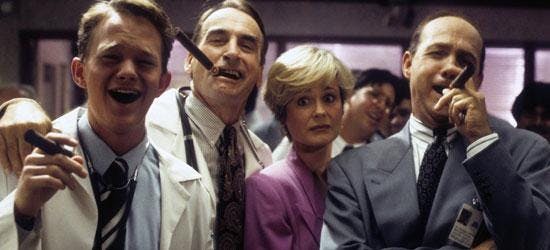
Sikking is semi-retired these days, but was kind enough to jump on the phone earlier this week to talk about Star Trek III, which opened 30 years ago today. During the conversation, he corrected the widely accepted assumption that it was Leonard Nimoy who hired him to play Captain Styles. Here’s what he had to say:
Let’s start by clarifying something. Most reports about your involvement in Star Trek III state that you were friends with Leonard Nimoy and that he brought you on board for the film. Was that the case?
SIKKING: No, actually it wasn’t Leonard. It was Harve Bennett. Harve was producing Search for Spock. He and I had gone to UCLA together. I was doing Hill Street at the time and he said, “Do me a favor. Come over. I’ve got this perfect little vignette for you. It’ll just take a day.” And I said, “Sure.” He’d hired me when nobody knew who I was and I couldn’t get hired. He and a couple of other people I went to school with, who were (later) at Universal, said, “Come over, I think I’ve got a part for you.”
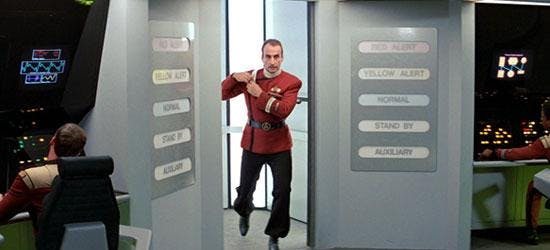
Had you even worked with Nimoy before?
SIKKING: No. All that stuff that you read is a joke. My grandson said, “Your father was something Harry…” and I said, “No, where did you come up with that?” He said, “Well, I googled you and…” I don’t know where some people get their information, but they just put anything out there they can.
Everyone in the world was at least aware of Star Trek, but were you at all familiar with it?
SIKKING: It was not my cup of tea. I was not into that kind of outer space business. I had an arrogant point of view in those days. I wanted to do real theater. I wanted to do serious shows, not something about somebody’s imagination of what outer space was going to be like. So I had a silly prejudice against it, which is bizarre because I’ve probably and happily signed more this, that or the other thing of Star Trek than I have anything of all the other work I’ve done. You see the kind of legs that Star Trek concept had. It’s absolutely amazing how addicted people are to it.
What intrigued you about this professional but arrogant man, Styles?
SIKKING: I guess they saw something in me that they thought would work for that character.
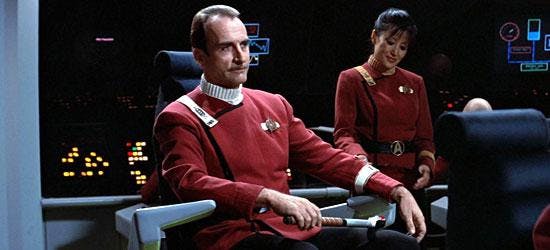
Whose idea was the swagger stick that Styles wielded?
SIKKING: I think… I think… I don’t know. I’m not sure if it was mine, but it was certainly a good idea. When I was studying acting years and years and years and years ago, we’d have a class and they’d say, “Go to the bus depot or to the train station or the airport. Take a little bag with you. Wear dark glasses. And go sit somewhere and observe people.” It’s true; you sit there and watch people, and how they move their bodies is far more communicative than dialogue. So any kind of a prop that reveals a character is well worth having in your hand or next to you.
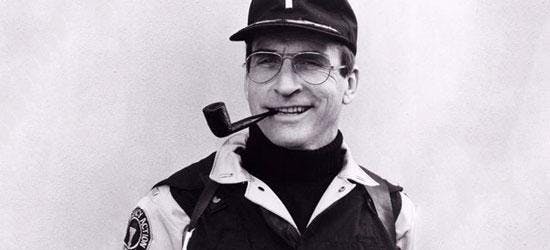
What do you remember of your day on the Star Trek III set?
SIKKING: It was fun. I liked being on a film because I’d been doing so much episodic television. You have some moments of leisure. You can have a conversation. You can take some time. Let me give you an illustration. They just released, for the first time, all 144 hours of Hill Street on DVD (visit www.ShoutFactory.com for details). It’s selling out there now. But what went through my mind was 144 hours. That’s 72 feature films, but they weren’t shot like feature films. We worked very, very fast on Hill Street, as you do on any television show.
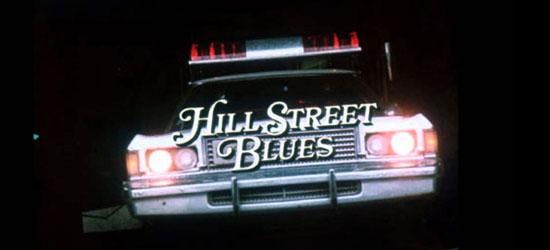
We have a couple of more Trek questions, but since you brought up Hill Street Blues, how amazed are you by the show’s enduring popularity, and by the reverence with which the show is regarded by viewers and the people making television today?
SIKKING: We shot the pilot 34 years ago, in March of 1980. That’s a couple of centuries in show business. In 1980, there were only three networks and there was always a local station. That was all over the country. There really weren’t any recording devices. They existed, but nobody could afford them. It sounds like we’re talking about antediluvian times, especially now because there are 70,000 shows on every night and you can pick and choose and record. So, when you look at that 1980s period, the power of a series like Hill Street – or like Star Trek in the 1960s – it was absolutely amazing. People got together on Thursday nights to watch Hill Street. It was an event. It was event television and people got together to see it, which I’m sure people did with Star Trek, too. There were certain shows that were a part of people’s lives, a part of their histories. Now, everything just flies by. If you get bored with something, you just go to something else. It’s a totally different marketplace now.
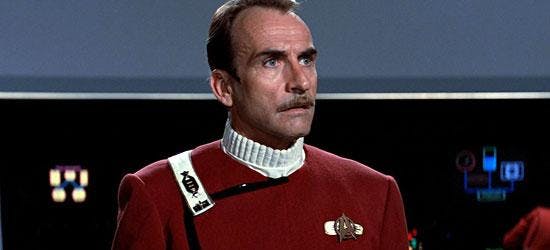
Back to Trek for a moment. The character lived on in a couple of Trek novels and a comic book, too, and they pretty much filled in his backstory. The comic even nicknamed him "Styles without Substance." And you crossed paths with another popular Trek actor, Bibi Besch -- who'd played Carol Marcus in Star Trek II -- when you co-starred as her husband in Doing Time on Maple Drive...
SIKKING: I didn't know any of that. That's very funny about Styles. And Star Trek never came up when I worked with Bibi. You and the fans surely know more about all these things than I do. I never followed any of it, but I think it's great.
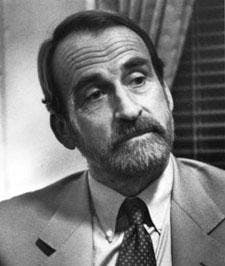
Last question. You’re mostly retired these days. What are you up to, and would you act again if someone offered you a good role?
SIKKING: I probably would do something if it got me going. Acting is a license to do self-investigation. It’s a great ego trip to be an actor. You say, “I have a legitimate reason to be doing nothing but thinking about myself, instead of hiding it.” I must say that, in the past few years in which I haven’t worked, the obscurity has been quite attractive. The wonderful thing about obscurity is it gives you a chance to be who you are and not some character. It also keeps you from being so self-conscious. When people recognize you all the time, you end up being self-conscious, and that’s a stifling way to live. So, I still do my charity events, but I’m happy to be with my family. I have four wonderful grandchildren and later today, at 5:15 tonight, I have to go to one of my grandchildren’s little league baseball games. The condiment of my life is good fortune.
